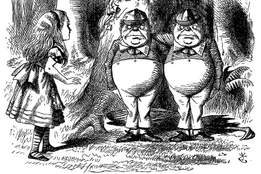‘Memorial Day’
This past Monday was Memorial Day, prompting that entry in the dictionary to spike in lookups.
President Joe Biden lauded the sacrifice of generations of U.S. troops who died fighting for their country as he marked Memorial Day with the traditional wreath-laying ceremony at Arlington National Cemetery.
— Aamer Madhani & Rebecca Santana, AP News, 29 May 2023
Memorial Day is the last Monday of May, observed as a legal holiday in most states of the U.S. in remembrance of war dead. It is intended as a recognition of those who have died in service, rather than those who have served in the armed forces and survived (the latter are honored on Veterans’ Day, November 11th).
‘Defect’
Defect was in many news stories last week, after a woman who has accused President Biden of sexual assault was said to have defected to Russia.
Tara Reade, a former Senate staffer who in 2020 accused Joe Biden of sexual assault, has said she had defected to Russia.
— Martin Pengelly, The Guardian (London), 30 May 2023
We define the verb defect as “to forsake one cause, party, or nation for another often because of a change in ideology,” and as “to leave one situation (such as a job) often to go over to a rival.” The word comes to English from the Latin dēfectus, meaning "to be lacking, fail, become disaffected, go over (to the side of an opponent).”
‘Catastrophe’
Catastrophe also had a busy week, after an insurance company announced that it was no longer going to sell certain policies in California, due to the likelihood of this word being relevant there.
State Farm to stop offering new home insurance policies in California due to “growing catastrophe exposure”
— CBS News, 27 May 2023
The sense of catastrophe that State Farm insurance company is using is “a momentous, tragic, usually sudden event marked by effects ranging from extreme misfortune to utter overthrow or ruin.” This sense is roughly synonymous with disaster. However, when catastrophe first came into English, in the 1500s, it had a very different meaning: “the final event of the dramatic action especially of a tragedy.” The word began as a theatrical term, by the 18th century was being used to refer to disasters such as volcanic explosions, and now is used by insurance companies to describe conditions they would prefer to not cover.
‘Pride’
Pride trended in lookups as well last week, as the month of June sees multiple events celebrating and acknowledging LGBTQ+ groups.
The start of June marks the beginning of Pride month around the U.S. and some parts of the world, a season intended to celebrate the lives and experiences of LGBTQ+ communities and to protest against attacks on hard-won civil rights gains.
— Deepti Hajela, AP News, 1 Jun. 2023
While pride has a variety of long-used and commonly-understood senses (including “reasonable self-esteem,” “exaggerated self-esteem,” and others), the one referenced here is distinct: “an event or series of events celebrating and affirming the rights, equality, and culture of LGBTQ people.” When Pride is used in this sense it is usually capitalized.
The modern Gay Rights movement (and the aforementioned sense of Pride) was strongly influenced by a riot that occurred at the Stonewall Inn in New York City on June 28th, 1969, in which some 400 people protested a police raid of that establishment. In June of the following year, marches commemorating the Stonewall riot were held in Los Angeles and New York City. Pride is frequently found, modified by the word gay, in early texts referring to these events.
Issue 19 reaches the stands on Monday June 29, the day after New York's mass Gay March and Gay In, concluding a week's activities on Gay pride and liberation.
— John Heys, Gay Power (New York City, NY), Vol. 1, Issue 19, 1970The Central Park gathering is rescheduled for Sunday, May 31. Until Christopher St. Liberation Day the committee will meet in conjunction with the Political Affairs Subcommittee on Gay Pride Week, chaired by Barbara Glover.
— (minutes of meeting) MS Gay Activists Alliance, 21 May 1970
At about the same time we see evidence of gay pride used in reference to a collective sense of self-worth, rather than tied to a specific event.
Gay pride seems to be catching, York University in Toronto, Canada has an on campus organization, York University Homophile Association.
— Homophile Action League (Philadelphia, PA), 26 Dec. 1970
By the late 1970s gay pride was shortened to pride alone. Initially, pride was used in capitalized form and followed by the year in which it occurs.
Groups, merchants, craftspeople and individuals interested in attending Pride '78 should call.
— Gay Community News (Boston, MA), 18 Mar. 1978
As Pride celebrations and events have progressed from year to year they have been attended and celebrated by an increasingly broad range of groups (adding those who identify as bisexual, transgender, asexual, and others). By the early 1990s, we see written evidence that reflects the broadened scope of Pride events: the date is often dropped, pride is sometimes capitalized and sometimes not, and it is applied to a much wider range of events.
People attending pride celebrations should also circulate and sign the Stonewall 25 immigration petitions.
— International Gay Association Bulletin (Brussels, Belgium), 1 Oct. 1991
Words Worth Knowing: ‘Ambidexter’
Our word worth knowing this week is ambidexter, which may be defined as either “an ambidextrous person; one that uses both hands with equal facility” or as “one that takes bribes or fees from both sides.” We hope you have more occasion to apply the first sense than the second.




